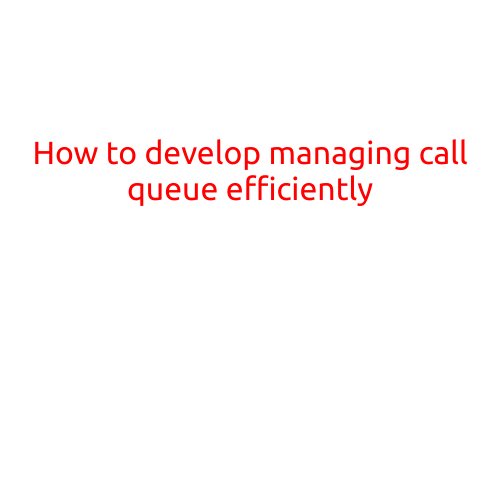
How to Develop a Call Queue Management System That Maximizes Efficiency
As a business, managing a high volume of customer calls can be a significant challenge. This is especially true for companies with a large customer base, diverse product offerings, or those that operate in industries with high-demand, such as healthcare or finance. One effective way to handle this volume is by implementing a call queue management system. In this article, we will discuss the importance of developing an efficient call queue system and provide actionable tips on how to do so.
Why Call Queue Management is Crucial
Before we dive into the tips, it’s essential to understand the importance of call queue management. When calls are not managed efficiently, it can lead to:
- Long wait times: Customers may be forced to wait on hold for extended periods, leading to frustration and potentially taking their business elsewhere.
- Loss of customers: Long wait times can cause customers to hang up and abandon the call, resulting in lost sales and revenue.
- Inefficient use of resources: Agents may be idle, waiting for calls, rather than actively handling them, leading to wasted time and resources.
- Poor customer experience: Inefficient call queues can lead to misunderstandings, miscommunications, and errors, negatively impacting the customer experience.
Key Components of Efficient Call Queue Management
To develop an effective call queue management system, consider the following essential components:
- Queue Prioritization: Implement a prioritization system to manage high-priority calls, such as emergency or critical customer issues, ensuring they are addressed promptly.
- Call Routing: Implement a call routing system that distributes calls based on agent availability, skill level, and customer preferences.
- Agent Allocation: Optimize agent allocation to ensure the right agent is assigned to each call based on their expertise and availability.
- Supervision and Monitoring: Implement real-time monitoring and supervision to ensure agents are handling calls efficiently and effectively.
- Customer Self-Service Options: Provide customers with self-service options, such as online chat, email, or voice assistants, to reduce the volume of calls.
Actionable Tips for Developing an Efficient Call Queue Management System
- Analyze Your Call Data: Study your call data to identify patterns, trends, and areas for improvement. This will help you streamline your call queue process and optimize agent allocation.
- Implement Automated Call Distribution: Use automated call distribution software to route calls based on agent availability, skill level, and customer preferences.
- Implement Call Back Options: Offer customers the option to schedule a callback or leave a voicemail, reducing the volume of calls and improving customer satisfaction.
- Train Your Agents: Provide agents with ongoing training and coaching to improve their skills and ensure they are equipped to handle complex customer issues.
- Continuously Monitor and Improve: Regularly review and analyze your call queue data to identify areas for improvement and implement changes to optimize your call queue management system.
Conclusion
Developing an efficient call queue management system is crucial for businesses to maximize customer satisfaction, reduce wait times, and improve agent productivity. By implementing the key components and actionable tips outlined in this article, you can ensure your call queue management system runs smoothly and efficiently, ultimately improving your overall customer experience.





